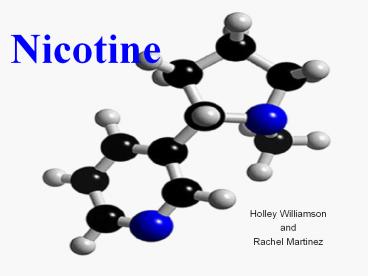Nicotine - PowerPoint PPT Presentation
Title:
Nicotine
Description:
Nicotine Holley Williamson and Rachel Martinez – PowerPoint PPT presentation
Number of Views:152
Avg rating:3.0/5.0
Title: Nicotine
1
Nicotine
- Holley Williamson
- and
- Rachel Martinez
2
Addiction
- Chewed, Smoked, or Inhaled
- Absorbed within 7 Seconds of inhalation
- Nicotine molecule shaped like a neurotransmitter
called acetylcholine - involved in many
functions, including muscle movement, breathing,
heart rate, learning, and memory - Instant kick
- Release of glucose and endorphins, spike in
pleasure center (dopamine) then downhill,
leading to need for more fatigue, irritability,
aggression and even depression - Withdrawal Symptoms a study
3
Depressant or Stimulant?
- Actually, its a stimulant
- Inhibits another inhibitor in the brain
- Induces a panic sensation from the body, but also
a rush of dopamine, so it feels relaxing
4
Why Smoke?
- Social Influences
- Peer pressure
- Learned coping mechanism
- Image
- Ignorance
- Its hard to quit because all these factors
interact with the physiological effects as well
5
Recent Research (NIDA)
- Nicotine increases levels of dopamine much like
Cocaine, Marijuana, and Heroin, but researchers
have found a key receptor component that is
critical in nicotine addiction. - Other research has shown that the genetic variant
that decreases the function of the enzyme CYP2A6
can help a person prevent nicotine addiction. - This is leading to new treatment capabilities,
including research on a nicotine vaccine and
pharmaceuticals that block the pleasurable aspect
of nicotine. - Another recent discovery is that the pleasure
center shows significant decreased sensitivity
during nicotine withdrawal, which helps with the
understanding of why it may be so difficult for
long term smokers to quit.
6
Nicotine as Medicine?
- Research shows that nicotine may produce positive
effects on ability to pay attention in ADHD
adolescents. It works much like the other
dopaminergic medications used to treat ADHD Thus
tobacco use in adolescents may serve as a form of
self-selected medication to improve some of the
cognitive difficulties that go along with ADHD. - Other research that focuses on nicotine as
medicineinvolves the cognitive functions of pre
and early Alzheimers patients. For example, from
Duke University Stimulation of nicotinic
receptors with nicotine or and/or novel nicotinic
agonists reliably improves certain aspects of
attentional and memory functioning in both normal
individuals, patients with ADHD, schizophrenia,
patients with Alzheimer's disease, and in our
preliminary studies, MCI patients.
(http//www.dukemednews.org)
7
Nicotine Treatment
- Behavioral therapy has been found effective in
some smokers replacing nicotine with other
rewards can help some people quit smoking. - Nicotine chewing gum or transdermal patches may
also help some quit smoking, with a gradual
reduction of nicotine levels during the quitting
period. - New smoking cessation products including
pharmaceuticals that target the receptors in the
brain are undergoing research and some are
starting to go on the market, including the drug
Zyban which helps control cravings. - In fact, a new vaccine that prevents nicotine
from reaching the brains of rats may offer hope
for smokers trying to break their addiction. The
compound, called NicVAX, may even prove useful as
an inoculation against nicotine addiction. It
works by reducing the levels of nicotine in the
brain through nicotine antibodies, and prevents
the nicotine from reaching the receptors, which
reduces the pleasurable effects that are so
addictive. (http//www.drugabuse.gov) - With the current treatments, rates of relapse are
the highest within the first 3 weeks of quitting,
and significantly drop after 3 months.































